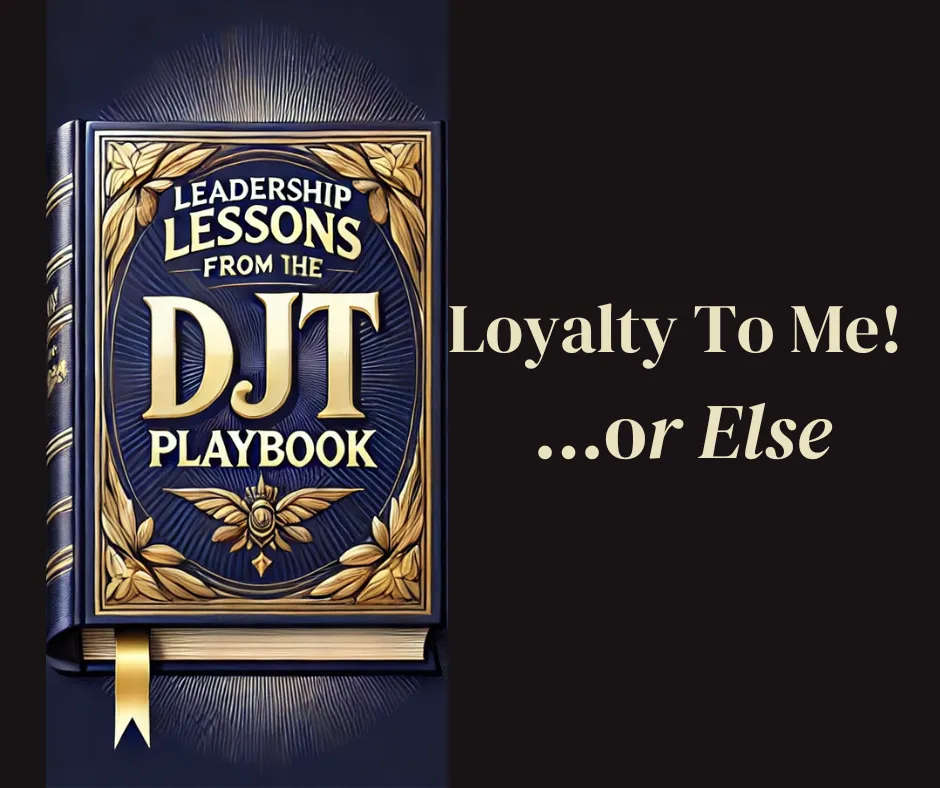The Me Mastery Blog
Take Actions That Change Your Life For The Better!

The Double-Edged Sword of Loyalty-Based Leadership
In leadership, loyalty is often heralded as a virtue - an essential ingredient in building a committed team, fostering trust, and driving collective success. This core aspect of DJT’s leadership approach places an exceptionally high premium on personal loyalty, often rewarding those who exhibit unwavering devotion while swiftly sidelining or politically exterminating those who do not. While this strategy can create a tightly knit inner circle, it also carries significant risks that can undermine both the leader and the organization.
The Strength of a Loyalty-Based Leadership Model
When loyalty is prioritized, it can often foster a sense of security and dependability within a leadership structure. Those who align themselves closely with the leader often feel valued and protected, which can enhance their motivation and commitment. Decision-making can become more efficient, as trusted allies are given authority and autonomy without the leader having to fear betrayal, being undermined or under constant scrutiny from those up close.
Additionally, an emphasis on loyalty can create a strong, unified front in the face of external challenges. It can ensure that the leader’s vision is carried out with minimal resistance and that the leader’s core ‘values’ remain supported, even under pressure – but often at the cost of the values of their followers In times of crisis, a leader who has cultivated loyalty may find that their team will stand firm, providing continuity and stability when other leaders might have faltered.
The Risks of Prioritizing Loyalty Over Competence & Accountability
However, loyalty-driven leadership can also be a hazard and a damning liability. If unwavering allegiance becomes the primary criterion for selection and advancement, competence and expertise often take a backseat. This can lead to the appointment of individuals who are more interested in pleasing the leader (or furthering their own agenda) than in making sound, independent decisions. Innovation, critique and dissent - both crucial for growth - may be stifled, as team members fear the consequences of voicing valid alternative perspectives and important insights
Loyalty-based leadership often fosters fear, anxiety, worry, and overwhelming stress among members of the organization. It creates an environment where people feel trapped, silenced, and constantly on edge, fearing retaliation for independent thought. Under this type of leadership, individuals often feel stuck, uncertain, and powerless—struggling to navigate shifting expectations and unpredictable consequences. Over time, this breeds frustration, emotional exhaustion, and even hopelessness, stifling creativity, innovation, and genuine collaboration. Instead of driving excellence, such leadership suffocates potential, leaving employees disengaged, resentful, and ultimately, seeking an escape.
Moreover, when loyalty is valued above ethical considerations, it can descend into blind loyalty. This can create an environment where questionable actions are overlooked, simply because they align with the leader’s interests. Additionally, the people serving the leader develop and perpetuate blind spots that prevent them from seeing critical dangers to them, to the leader… and most importantly to the organization and its staff and customers. Over time, these can erode institutional integrity, breed complacency, and foster an atmosphere of distrust among those who recognize the imbalance.
In addition, when leaders who enjoy this type of ‘support’, are threatened, they often react, respond and resort to the abuse of their power – either striking with the ‘sword’ – or wielding the ‘mighty pen’ as their ultimate weapon.
Blind followership denies and strips an organization of the collective knowledge, expertise and wisdom of its people. Thus, blind followership is a danger that no company, organization or country should allow itself to descend into and be trapped in.
Blind loyalty can and often leads to the birth of dictatorship and the decimation of respect for good governance. Blind loyalty is a one-way, rocky and slippery path to the edge of the precipice – and then over – the cliff of reason and common sense, from which there is potentially no climbing out of the depth of despair that ultimately settles in.
A Balanced Approach
Effective leadership requires more than unwavering allegiance; it demands a combination of trust, expertise, responsibility and accountability. While loyalty has its merits, it must be balanced with the ability to challenge, adapt, and make decisions that serve the greater good rather than a singular authority. When handled wisely, loyalty can be a powerful tool – but when mismanaged, it can become a leader’s greatest weakness – and more worryingly – the beginning of an entity’s demise.
True loyalty should be earned through trust, not demanded through fear. Encouraging diverse perspectives, rewarding merit, and fostering ethical decision-making create a healthier, more effective leadership model. When leaders prioritize integrity over blind allegiance, they cultivate resilience, innovation, and lasting organizational success.
© 2025 All Rights Reserved - Dr. Marcus Mottley

